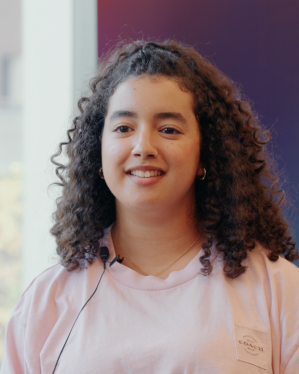Wharton Sports Analytics and Business Initiative
News
Preparing the Next Generation of Analysts: Inside the Wharton Sports Analytics Research Lab
This summer, the Wharton Sports Analytics and Business Initiative (WSABI) hosted its second Sports Analytics Research Lab, an intensive program designed to deepen students’ expertise in data science and statistics through hands-on research in sports analytics.
For the first part of the Lab, students learn advanced statistical concepts and coding techniques from doctoral candidate Ryan Brill and pursue a sports research project of their own design. Then, later in the summer, they spend time with the Wharton Moneyball Academy as Teaching Assistants to Adi Wyner, Professor of Statistics and Data Science. The Wharton Moneyball Academy, hosted in partnership with the Wharton Global Youth Program, is a sports analytics class composed of high school students from around the world, helping them learn advanced techniques and how to navigate the complicated world of sports statistics. Among the participants of this year’s Lab were Sofia Boubsis, a sophomore at Wharton, and Justin Hughes, a rising junior.
From the Classroom to Real-World Applications
Boubsis, a finance and statistics major at Wharton who is also pursuing an accelerated master’s in data science, discovered her passion for sports analytics after arriving at Penn. As a Model UN student and a varsity swimmer in high school with a strong background in math, Boubsis was introduced to the world of sports analytics at Wharton during a coffee chat she set up with an MBA student. “I was talking about how much I love data science,” said Boubsis,” and I wanted an outlet where I could apply these concepts and learn during the process. So, she recommended to me to try out the Wharton Sports Analytics Research Lab, which is run by Professor Wyner, who she had in class.”
Boubsis’ involvement in the Wharton Sports Analytics Research Lab provided her with a deep dive into the coding language R and presented her with novel applications of Python. In the Lab, her team worked on developing an optimized draft bot for fantasy football, a project that required extensive coding and statistical analysis. “Before the Lab, I had never done any sports analytics projects or even coded extensively,” Boubsis shared. “This summer, I learned how to code in ways I never thought I would, applying Python to real-world sports data.”
For Boubsis, the Lab was more than just an academic exercise; it was a platform to combine her love for sports and analytics in a meaningful way. While she’s no stranger to teaching others – she’s been tutoring students since high school – she found working with the students in Moneyball Academy to be particularly fulfilling. “The students were from diverse backgrounds, and while they were at different levels of understanding, they all shared a strong intellectual curiosity,” she said. “It was rewarding to see them grow and develop their skills over the course of the program.”
“Before the Lab, I had never done any sports analytics projects or even coded extensively. This summer, I learned how to code in ways I never thought I would, applying Python to real-world sports data.”
Sofia Boubsis, Sophomore, The Wharton School
A Lifetime of Statistics
Justin Hughes, a sports enthusiast with a passion for analytics, brought a different perspective to the Lab. Hughes’ love for sports began as early as he could remember. He’s played basketball since the second grade, and he currently competes on the men’s club team at Penn. He can trace his interest in numbers and sports statistics back to when he was a little kid, simulating entire seasons of box scores and gameplay metrics using a collection of miniature football helmets.
In high school, Hughes was actually a member of the Wharton Moneyball Academy: Training Camp, a condensed version of the Moneyball Academy for which he is now a TA. “It was my first exposure to real sports analytics and sports statistics,” he said. “Naturally, once I came to Penn, I tried to reconnect with WSABI.”
This is his second year participating in the Wharton Sports Analytics Research Lab; the camaraderie and skills it offers warrant repeat attendance. “It allows me to develop my quantitative skills while working on real projects that combined my love for sports with data analysis.”
As for Moneyball Academy, Hughes found satisfaction in helping students who are in a similar position he was in during his time with Training Camp. “It’s extremely rewarding to see how people come into the program with little to no coding experience, and then after two and a half weeks, they are making these super engaging and interesting graphs that allow you to draw some deep analysis about a research question that they’re interested in,” he said.
“It’s extremely rewarding to see how people come into the program with little to no coding experience, and then after two and a half weeks, they are making these super engaging and interesting graphs that allow you to draw some deep analysis about a research question.”
Justin Hughes, Junior, The Wharton School
Hughes’ own research this summer focused on evaluating college basketball players’ shooting and scoring potential for the NBA. His group aimed to identify players whose skills would translate well to the professional level using advanced tracking data. “It was exciting to see how our work could potentially influence decisions at higher levels of the sport,” he reflected.
For Hughes, Boubsis, and other TAs, the Wharton Sports Analytics Research Lab also offered unique opportunities to engage with the Philadelphia sports community. This summer’s Lab included excursions to the Wells Fargo Center, where students were given a thorough, behind-the-scenes tour before hearing from a panel of operations and data science professionals. Later, the group headed to the Philadelphia 76ers’ practice facility, which offered insights into the business side of sports. “It was fascinating to see how data science is applied not just on the court, but also in operations and fan engagement,” Boubsis noted.
Looking Ahead
As they move forward in their academic and professional careers, both Boubsis and Hughes recognize the sizable impact the Wharton Sports Analytics Research Lab has had on their development. For Boubsis, the Lab solidified her interest in applying data science to business, whether in sports or other industries. Hughes, on the other hand, is still exploring his options but is confident that the skills he honed in the Lab will be invaluable in whichever field he chooses to pursue.
The Wharton Sports Analytics Research Lab continues to be a cornerstone for students like them, who are eager to push the boundaries of data science and sports analytics. By combining rigorous academic instruction with real-world applications and mentorship opportunities, the program is shaping the future leaders of the analytics world.




